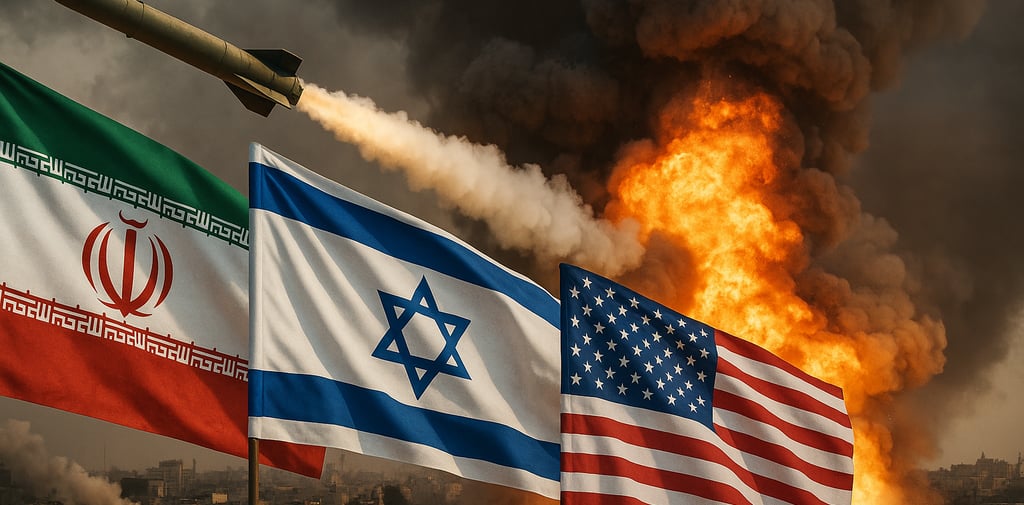The 12-Day War: What We Learned and What’s Next
This article analyzes the recent 12-day war between Iran, Israel, and the U.S., highlighting its military, diplomatic, and geopolitical implications for the future of the Middle East.
Bilal Nour Al Deen
6/25/20253 min read


The world has just witnessed twelve intense days that pushed the Middle East—and global stability—to the brink of a powder keg. These events laid bare the fragility and volatility of our deeply interconnected modern system. In a swift and direct confrontation, three nations—Iran, Israel, and the United States—clashed, igniting signals that will require long-term reflection as we seek to understand their implications for the future. This brief but profound crisis offered critical lessons across military, diplomatic, ideological, and technological dimensions.
Iran’s Setback — But Not Defeat
Undoubtedly, Iran — a country that has long built its regional project on three pillars: armed allies across the Middle East, a growing and increasingly precise missile arsenal, and a nuclear program that has sparked fear and controversy for decades — was dealt heavy blows during the recent war, particularly in terms of its nuclear program and a large portion of its military arsenal on one hand, and the swift killing of its leaders on the other. The American-Israeli alliance may have pushed its nuclear program decades backward. Nevertheless, Tehran may have lost this round, but it has not and will not abandon its nuclear ambitions. Determination is not erased by airstrikes — especially considering that Iran may have preserved quantities of enriched uranium in secret locations. In other words, the program might be revived years from now, though that does not necessarily mean Iran will return as the dominant force in the region as it once was.
Israel’s Show of Force — and Vulnerability
As for Israel, it now resembles the charging bull of the new Middle East — yet it still received significant blows from Iran. It is true that preventive deterrence has become a central component of its strategy after the events of October 7, 2023, but the war also exposed major vulnerabilities, including Iran's ability to bypass Israeli air defense systems. That is, despite the accomplishments achieved against Tehran under the banner of "We will strike when we feel danger," Tel Aviv must think twice before playing with fire again — whether with Iran or others. Israel will undoubtedly need time to heal its wounds.
Discord Despite Alliance
Although Donald Trump fulfilled Benjamin Netanyahu’s desire to bomb Iranian targets, the American-Israeli disagreement is clear and cannot be hidden. The objectives were not identical. Netanyahu wanted to eliminate the nuclear program and even bring about regime change in Iran, while Trump wanted to weaken Tehran to bring it to the negotiating table — without touching Supreme Leader Ali Khamenei. This divergence may leave a rift in the relationship between the two men, the effects of which we may witness in the near future.
As for the precision surgical strikes on the Fordow nuclear facility, they were a stark reminder that Washington still sits atop the throne of technological supremacy — and when it decides to use it, the results are both overwhelming and calculated.
Is This The End—Or The Dawn Of A New War?
In the end, this was not merely a short war — it was an encrypted message from the future. It was a warning that “nuclear latency” is like a powder keg awaiting a spark, and that the Middle East remains prone to ignition at any moment. The war also revealed the fragility of alliances under the pressure of diverging calculations, no matter how solid they may appear on the surface, and showed that even the most coordinated military operations do not necessarily guarantee clear or lasting political outcomes.
In short, these few days were a harsh test of regional balances, and a clear signal that the geopolitical future of the region depends on decisions made now — not later.
So, are we witnessing the end of an era? The beginning of a new one? Or just a temporary truce in a long-term conflict?
As always in the Middle East, the answer is: yes.
Contact me via email
SUBSCRIBE TO MY NEWSLETTER
hello@bilalnouraldeen.com
© 2025. All rights reserved.